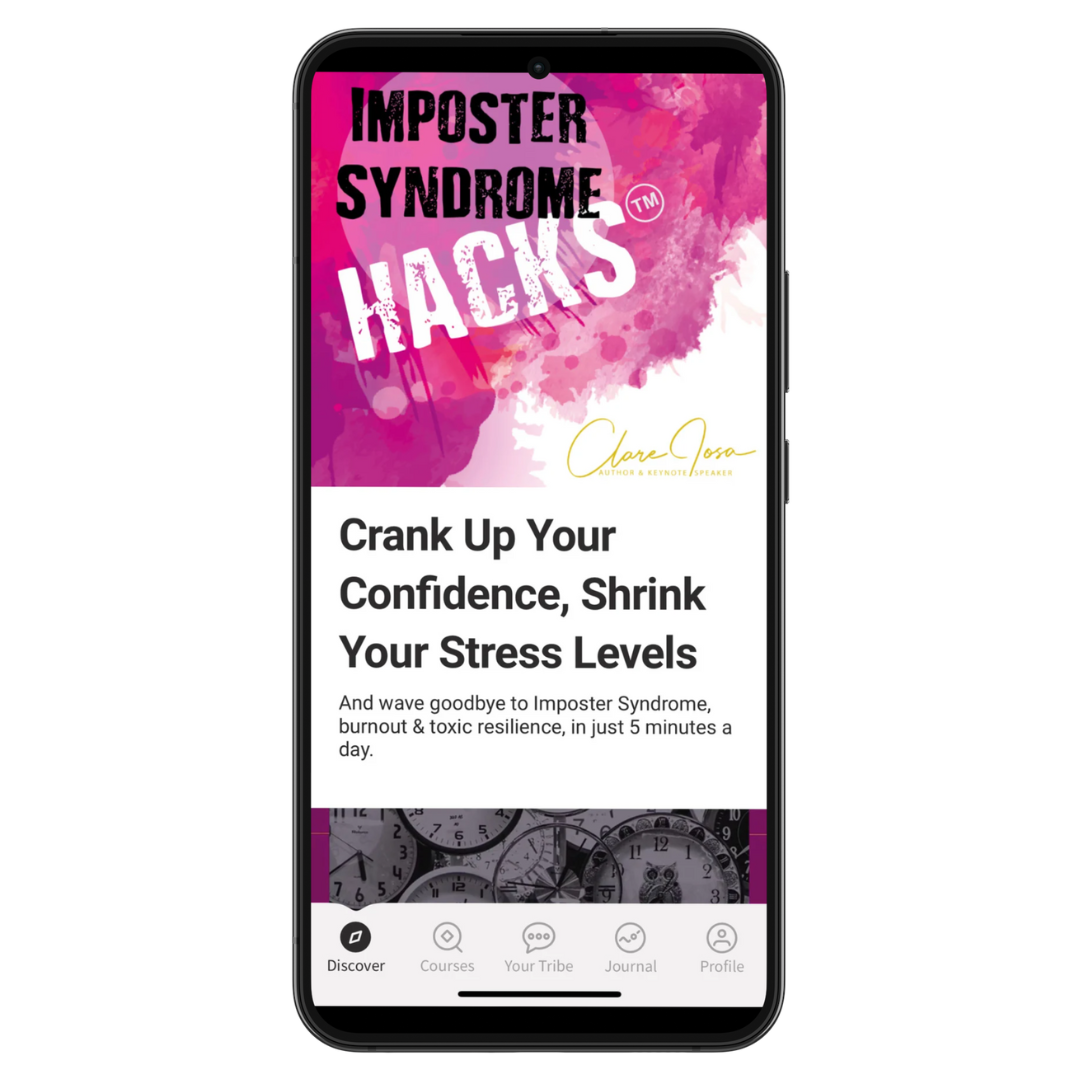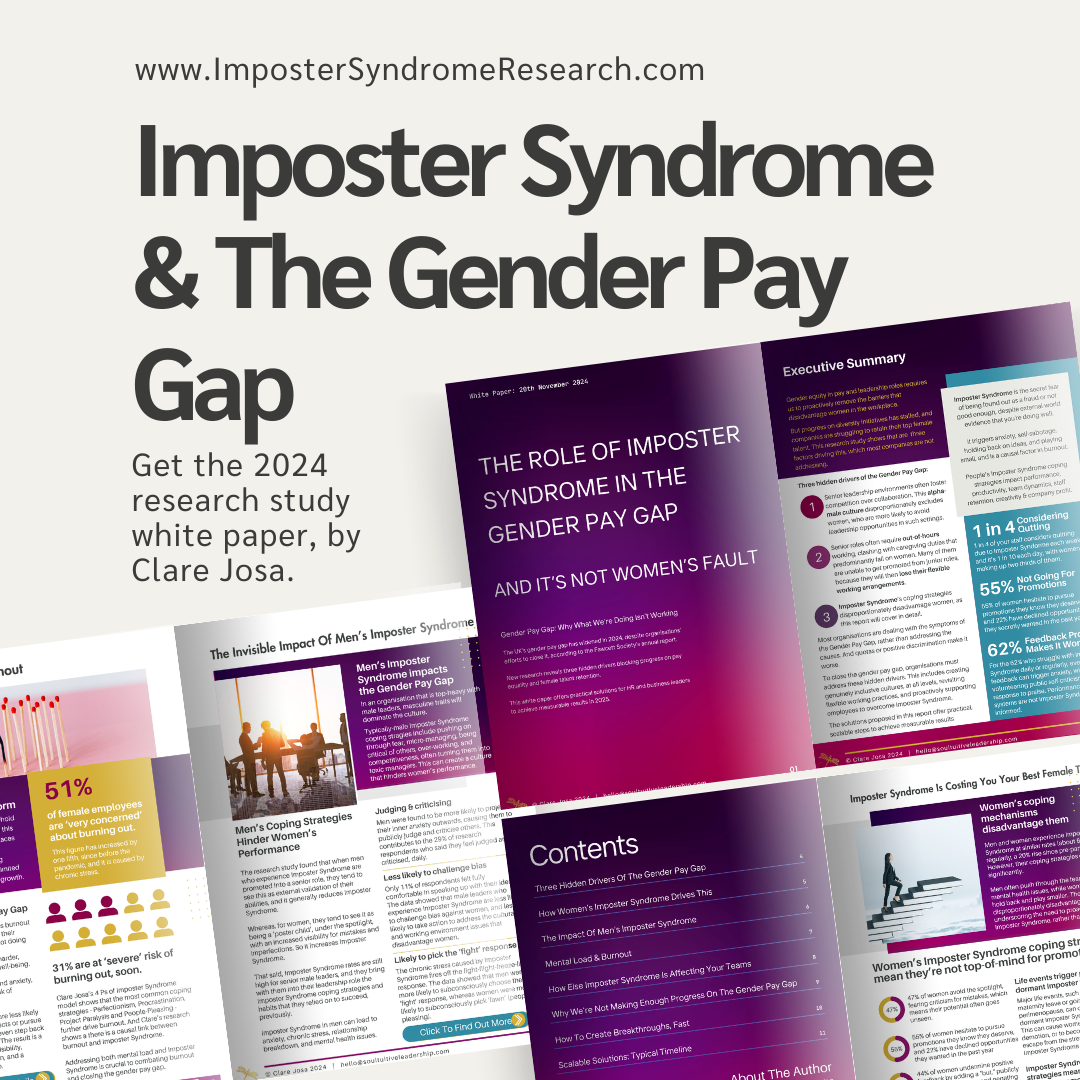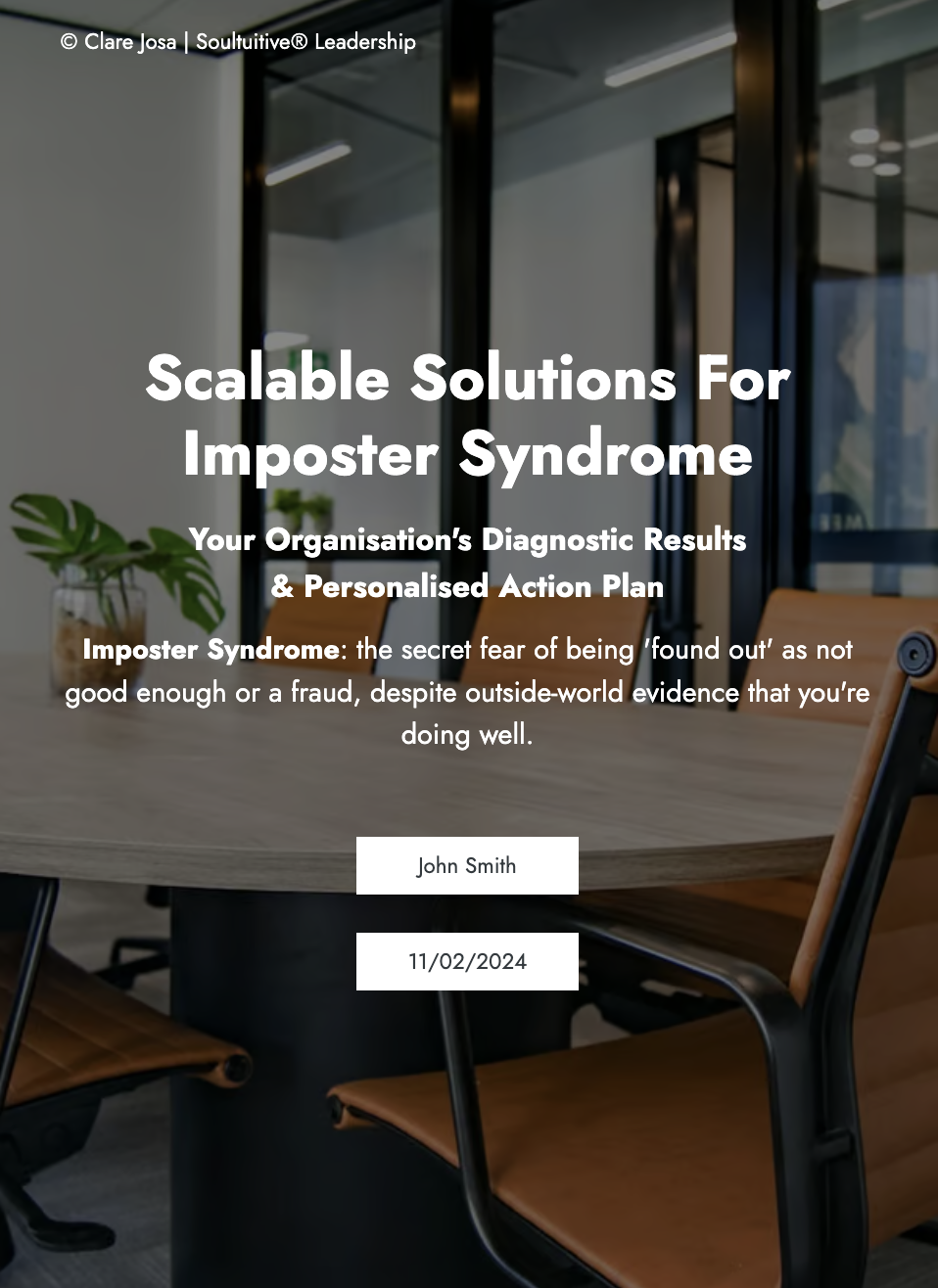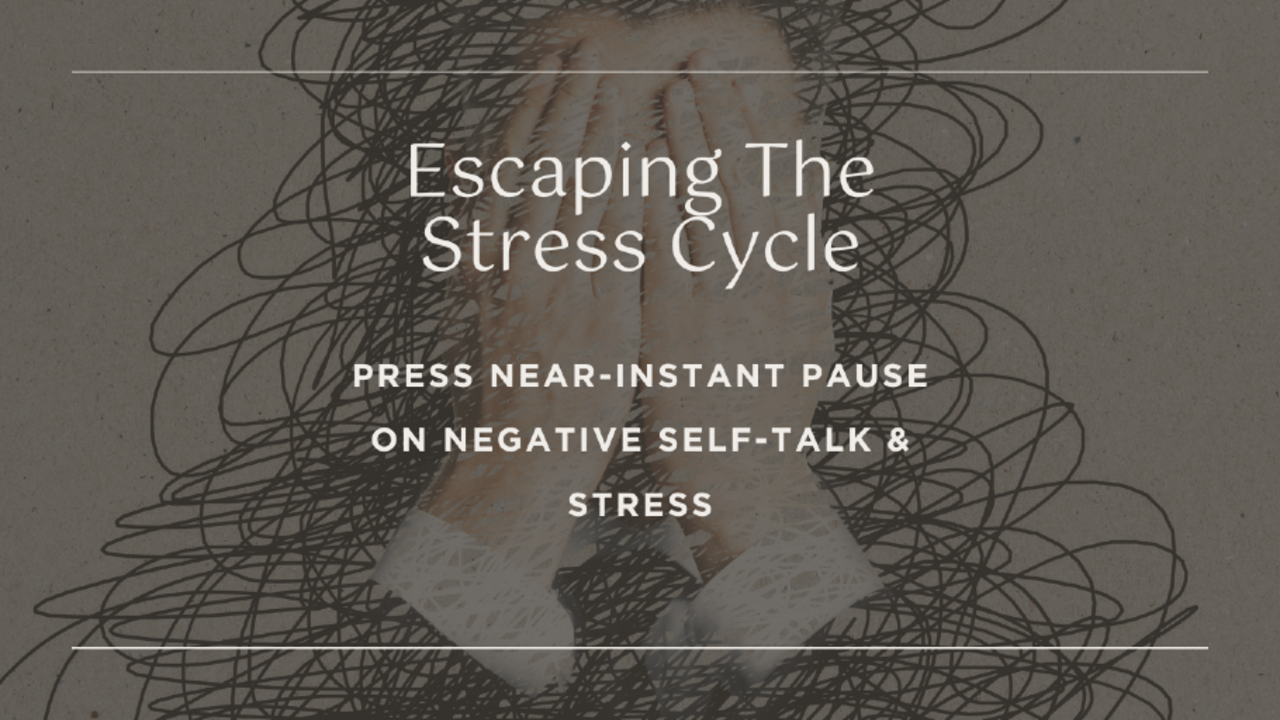Mental load, burnout, and imposter syndrome create a perfect storm that significantly contributes to the gender pay gap.
In this episode, we delve into some very concerning statistics from the 2024 Imposter Syndrome Research Study that show how these issues disproportionately affect women, leading to chronic stress and limiting their career growth.
The research highlights that over half of female employees are 'very concerned' about burnout, and 31% are at 'high risk'. Many are being driven to exhaustion by a combination of Imposter Syndrome coping strategies, impossible workloads, too many meetings, and juggling household responsibilities alongside their professional lives.
This episode challenges the cultural assumptions that still exist in workplaces, including the outdated notion that leadership roles are designed for people with housewives.
The 2024 Imposter Syndrome Research Study found that mental load and burnout, combined with Imposter Syndrome, create a perfect storm for fuelling the Gender Pay Gap.
And too many companies still create leadership-level roles based on 1950s assumptions about leaders having housewives to run their lives.
It's time for a change, and men need to step up to become allies at home, as well as in the office.
Clare Josa, Lead researcher
2024 Imposter Syndrome research study
What You'll Learn About The Mental Load, Imposter Syndrome and the Gender Pay Gap
Join Clare as she explores actionable steps to address these systemic and cultural issues and shares practical solutions for a more equitable work environment for everyone.
Listen Now: Episode 70
The Perfect Storm: Mental Load, Imposter Syndrome and the Gender Pay Gap
Subscribe to the Ditching Imposter Syndrome Podcast
This Episode's Resources:
Research White Paper
Discover what the latest research says about the role of Imposter Syndrome in the Gender Pay Gap, and how organisations need to address this.
>>> Get The White Paper <<<
What's Your Score?
Clare has turned her research studies into a quiz-style assessment you can take to gain insights into how Imposter Syndrome is affecting your organisation.
>>> Take The Quiz <<<
Escaping the stress cycle
Wish you could get off the stress rollercoaster? What if you could do it in just 5 minutes a day? Look for the 'Escaping The Stress Cycle' course in the Imposter Syndrome Hacks™ App.
>>> Get your first 30 days for free <<<
Taking Action: #DoOneThing
If anything were possible, how might you redesign jobs at all levels of your company to mean that people don't need a housewife, to be able to do them?
Join in the discussion in the Imposter Syndrome Hacks™ App - free - here's how

Prefer To Read? Here's The Transcript For This Episode.
Welcome to episode 70 of the Ditching Imposter Syndrome podcast with me, your host, Clare Josa. And today is the fourth and final part of the mini series I've been running about the imposter syndrome research study we've just published.
Today we are going to look at how mental load and burnout plus imposter syndrome is a perfect storm for the gender pay gap and the surprising things that we need to do to address these. So this miniseries has been accompanying the white paper we've just published, which you can find and download as my gift at imposter syndrome.
Read research.com I will make sure we put that link into the show notes as well. And in this episode, I really want to talk about mental load, burnout and imposter syndrome and how they combine together.
Now, back in 2022, we ran a research study into the link between imposter syndrome and burnout and we found that there is a causal link. I'm not going to go into that in too much detail in this episode because I've already done whole episodes on it.
You can find that episode number 48 and episode number 53 wherever you love to get your podcasts and there will links to these in the show notes as well.
But in essence, the chronic stress, the overworking, the four Ps of imposter syndrome, the perfectionism, procrastination, project paralysis and people pleasing all contribute to chronic stress, elevated baseline cortisol levels and the body basically saying, I'm about to burn out. We found that 51% of female employees are currently very concerned about burning out.
And this figure has increased by a fifth since before the pandemic. It's caused by chronic stress.
And our last two research studies have shown that the link between imposter syndrome and burnout is a causal link, not a correlation. You increase one, you increase the other, you reduce one, you reduce the other. So these two are linked.
But in the 2024 research study, we also looked at the impact on mental load. We've been looking at why not managing to close the gender pay gap, why we're still struggling to have truly diverse leadership teams.
And mental load is one of the additional factors that most organizations are overlooking. So in case you've not come across the term or English isn't your first language.
Mental load is that feeling of constantly spinning plates, constantly having in the back of your mind, I need to remember to do this, I need to fix that problem, usually with quite a strong stress based exhausted response. And in the context we were researching, it is about juggling household and caregiving responsibilities with work.
This can be everything from remembering you've got to phone the plumber to try and get them to come and service the boiler so it doesn't fall apart and stop working for six weeks over the winter, through to remembering that one of the kids has got home clothes day next Thursday and you've got to make sure they've got things without holes in their knees and two pounds to put in the red bucket at the gate as they walk into school. It's this kind of thing, and the thing is that it plays in the back of your mind.
And there are physiological reasons why this takes energy, even when we're not consciously thinking about those things. Now, unfortunately, this mental load in the UK predominantly still falls on women.
It absolutely shouldn't, and we need some deep cultural changes in our country to fix this, but at the moment, that's where we are.
It places an overwhelming emotional and cognitive burden on women, causing chronic stress and leaving them with limited time or energy to focus on their career growth.
And here's the thing, despite this, so many women are doing brilliantly, but they are having to juggle both the mental load and putting the energy into their careers. And this is one of the reasons why they are at much more severe risk than men of burning out.
In fact, our research study found that 31% of women are at severe risk of burning out soon. So as I said, imposter syndrome exacerbates burnout, partly because it causes women to question their abilities, to fear they're not doing enough.
And this can make them overcompensate by working, working harder, longer hours, pushing themselves, often at the expense of their well being. When this happens, they get stuck in chronic stress. The fight flight freeze response is designed to last for minutes, not months.
And it and imposter syndrome trigger anxiety. What if in catastrophizing, which further increases the risk of burnout. And as burnout starts to set in.
Remember, burnout is a sliding scale, not an on off. Women are less likely to take on high profile projects or pursue leadership roles, and they might even step back from their careers entirely.
In fact, one in ten of your teammates will consider quitting due to imposter syndrome today. It's one in four this week and about two thirds of those are women. Some of them will actually decide to quit. In fact, quite a few of them will.
So you're losing some of your best talent due to this perfect storm.
This result of stepping back from those high profile projects means that women don't become top of mind for promotions and opportunities and it becomes a vicious cycle of reduced visibility, stunted career progression and a widening gender pay gap. When you consider all of this, it's actually quite astounding that women are performing at the level that they are.
Just imagine what more they could achieve, how much more potential they could fulfill, how much more impact and influence they could have if they weren't also juggling this mental load with burnout and imposter syndrome. Why is this not holding men back? Because I hate to say this, in the UK, the vast majority of mental load is falling on women's shoulders.
And culturally we still have an attitude where, for example, schools will traditionally phone the mother instead of the father if the child is ill and needs to be picked up from work.
One of the trends we've been following recently has been women taking part time roles in order to be able to do this juggling because they've realized they cannot work full time and juggle the mental load of the responsibility, the caring responsibilities and looking after the home and everything else that needs to happen. Whether this should be falling on their shoulders or not isn't the issue right now. The fact is they're moving to work part time.
And one of the things that happens in senior roles is you lose that flexible working. There becomes an assumption that you have to work full time and ideally full time in the office just because you got promoted.
When women have had to make the choice to work part time in order to be able to juggle home and work and give their best to both, it's no surprise that the removal of that flexible working as you get promoted risks excluding them.
In addition, as we talked about in episode 67 where we looked at three hidden causes of the gender pay gap, it's not just this lack of flexible working that excludes women, partly due to the burnout and the mental load and imposter syndrome.
It is also the fact that the more senior you get, the more it is assumed that you're going to put in more hours, particularly out of hours working that might be involving client entertaining or travel.
And this is something that women who've got caring responsibilities and home responsibilities often struggle to do, leaving them feeling like they're being forced to choose between their career and their caring responsibilities and their family and their loved ones. It shouldn't be this way. And there are two things we can do that could start to make a difference to this right away.
The first one, this is a call out to partners, typically men. There are so many men Particularly on places like LinkedIn, who are being very visible allies to women in the workplace.
But are you really being an ally at home? Are you really sharing the mental load or are you just offering to help? So here's the thing. The mental load isn't about the to do list.
The mental load is about the thinking that meant the to do list even exists.
Truly being an ally to women means divvying up those responsibilities, the thinking responsibility, not asking your partner at home what she needs you to help with, but actually agreeing how you're going to split the thinking and the plate spinning and taking responsibility and actually getting that stuff done. Now, this has two effects.
Not only does this free up some headspace and energy with the woman and it much reduces her chances of burning out and it reduces the severity of her imposter syndrome because she's less likely to be stuck in chronic stress. But there will also be more times where you have to say no at work because of your mental load and the responsibilities that you have at home.
And this then normalizes the right to have that balance.
Because if it is predominantly the women who are asking for this, that can very quickly create a culture where people don't want to promote women because they see them as not committed and dedicated enough to the company.
If men are experiencing this too and genuinely sharing that plate spinning, thinking, responsibility, then it materially changes the conversations we're having in the workplace about work, life balance and flexible working. It makes it an everyone thing, not just a mother thing.
And by making it an everyone thing, then what it does is it means it opens up the opportunity for a brand new discussion where we can actually look at one of the things that's actually causing this problem and potentially do something about it. Here's a rotten tomato alert that is blindingly obvious when you've heard it, but most business leaders do not want to hear.
The vast majority of senior level roles in organizations are still based around 1950s assumptions that the role is filled by a man who has a housewife at home to run his life. It's really obvious when you think about it.
Yeah, the extended working hours, out of hours work, assuming that there's somebody else at home that is going to make sure that the kids are picked up from school, that the animals have been fed, that the dry cleaning has been collected, that the plumber has been sorted so that heating won't break down. All of this in the 1950s was done predominantly by the housewives.
But if you have a partnership in a marriage or a relationship where Both partners are working, then there's no housewife. But senior level roles still assume you have one.
I know people who have two people in a relationship where they both have reasonably senior jobs and they have to rely on having two nannies to be able to cover the extended working hours because it's too much for just one nanny, which surely should mean it's too much for one litre. And also to do all of the juggling and a lot of the mental load work that comes with that responsibility.
We asked female respondents in the research study about their energy levels and 22% of them said they are tired all the time or on their knees.
So not only do male partners need to step up and genuinely share that mental load, the co responsibility for the thinking, rather than just asking what they can do to help once the woman's done the thinking that is exhausting her, but we also need to rewrite the rules on how work runs. Why is it acceptable that somebody should have to do a 14 hour day just because they're in a leadership role?
61% of respondents in our research study said they have far too many meetings to be able to get their main workload done, particularly in leadership roles.
And a lot of the leaders that we interviewed said they routinely take annual leave just to get a meeting free day to be able to get proper strategic thinking work done. This is not okay. The system is really broken.
So my invitation to you today the do one thing in addition to men being allies at home as well as at work is to consider this question.
If anything were possible, how might you redesign jobs at all levels of your organization to mean that people don't need a housewife to be able to do them?
Yeah, if anything were possible, how might you redesign leadership roles so that people don't have to sacrifice the flexible working that they've previously relied on to be able to juggle home life and work and to be able to show equal passion for both.
And what might the objections be in your organization to the proposal that you rewrite the rules so that stepping into leadership positions doesn't require you to have a housewife at home to be able to do your job?
And I want to wrap up this episode by reminding you I am not blaming here and where I've talked about men and women, you can insert your own version of whatever your close relationships look like.
These are general trends that we're seeing from the research study, but we have hit a crunch point where burnout rates and risks for women are so high, partly driven by imposter syndrome partly driven by culture and environment in the workplace, workloads being impossible, meeting loads being too high, the mental load of juggling those spinning plates.
Yeah, they're mixing my metaphors here of work and home, that if we don't take really drastic action pretty soon to redesign the way we're working, we're going to lose those women from the workforce.
You're already losing them, and it is time for us to stop pretending that it's the 1950s and that it's okay to design any job around somebody needing a housewife at home to organize the rest of their life. I'd love to hear from you on this. I think it's such an important discussion in the Show Notes.
You will find a link to join in the discussion inside the private forum in the Imposter Syndrome Hacks app. Come and join me there.
I can't wait to hear what you're thinking about this and also make sure you do my quiz style assessment for your organization to find out to gain insights into how imposter syndrome is really affecting your teams in four core areas and how ready you are to take action on it, including how to overcome any potential objections. The link for that assessment is also in the Show Notes.
Normal podcast service will resume from the next episode when we're going to be talking about imposter syndrome, hypervigilance and psychological safety at work.
There's quite a few kind of jargony terms in there, but this one's going to be a really practical episode to help you understand some of the ways that imposter syndrome is actually triggering the fight flight freeze response in people that you might not expect, and your obligations under Psychological Safety at Work legislation and what you can be doing about it. Whether you're the employer or somebody working in a team seeing this happening.



